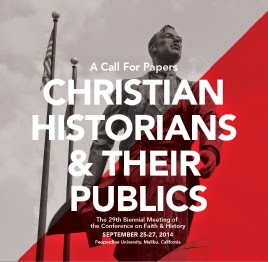 Last night I attended the opening address of the Conference on Faith and History with the keynote speech provided by Civil War historian Allen Guelzo. Guelzo gave an excellent talk on Lincoln’s Gettysburg Address. He noted several misconceptions (for instance, Lincoln did not write the speech on the way to the ceremony honoring the dead at Gettysburg) and noted the inspiration for the content of Lincoln’s remarks. He presented numerous points but here are a few:
Last night I attended the opening address of the Conference on Faith and History with the keynote speech provided by Civil War historian Allen Guelzo. Guelzo gave an excellent talk on Lincoln’s Gettysburg Address. He noted several misconceptions (for instance, Lincoln did not write the speech on the way to the ceremony honoring the dead at Gettysburg) and noted the inspiration for the content of Lincoln’s remarks. He presented numerous points but here are a few:
- The Gettysburg address is almost “anorexic” in verbal expression with so much packed into 272 words.
- The address marked the transition from classical speech in American politics to “middling” speech which was a more common form of oration.
- Lincoln clearly declared the importance of those who died at Gettysburg as the guardians of democratic principles worth dying for. Democratic ideals survived at Gettysburg even as many soldiers did not.
- We would not remember the elegance or importance of the address if the North had lost the war. If the South had won, the North might have faded into a “Scandinavian irrelevance.”
- In his second inaugural address, Lincoln delivered a speech which recognized that the North and South had their “hands in the toilet over slavery.” Noting that Lincoln asserted that God’s judgment had been delivered on both sides, Guelzo referred to the end of Lincoln’s address:
Yet, if God wills that it continue until all the wealth piled by the bondsman’s two hundred and fifty years of unrequited toil shall be sunk, and until every drop of blood drawn with the lash shall be paid by another drawn with the sword, as was said three thousand years ago, so still it must be said “the judgments of the Lord are true and righteous altogether.”
With malice toward none, with charity for all, with firmness in the right as God gives us to see the right, let us strive on to finish the work we are in, to bind up the nation’s wounds, to care for him who shall have borne the battle and for his widow and his orphan, to do all which may achieve and cherish a just and lasting peace among ourselves and with all nations.
Guelzo’s speech was worth the price of admission and was a wonderful beginning to the conference.